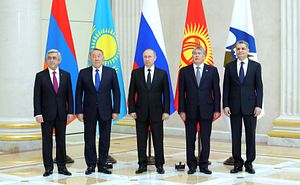After 24 months of bickering, slights, and stalled promises, it’s little surprise that the two-year anniversary of the founding of the Eurasian Economic Union (EEU) passed with little fanfare earlier this month. What Moscow once pledged as one of the world’s primary geopolitical “poles” has, instead, accelerated toward something its critics long assumed it would eventually become: a largely empty-shell organization, good for summits, photo-ops, and mutual back-slapping — but little more.
To be sure, like the Collective Security Treaty Organization (CSTO) before it, the EEU isn’t entirely without impact. However — and, again, like the CSTO — much of that impact, if recent coverage is anything to go by, has been largely negative. Indeed, there’s an argument to be made that since the EEU’s 2015 inception, relationships between every single intra-EEU country have suffered, save, perhaps, for relations between Minsk and Astana, and between Moscow and Bishkek. The other relations — Moscow and Minsk, Astana and Bishkek, Yerevan and everyone else — have either flat-lined over the past two years, or worsened outright.
Much of the souring, of course, has less to do with the EEU’s on-the-ground impact and more to do with Moscow’s decisions, ranging from the Kremlin’s counter-sanctions regime to the increased tensions Russia’s neo-imperialism has engendered in Belarus and Kazakhstan. But there’s a reason the EEU coincided with Moscow’s attempts at returning to international prominence and why other member-states, most especially Kazakhstan, have attempted time and again to slow Moscow’s pushes for everything from common passports to a common currency.
If anything, the EEU’s inception — or the timing of it, at least — has coincided with perhaps greater acrimony between the member-states than any period since the fall of the Soviet Union. For instance, Armenia has increasingly grated against fellow CSTO (and EEU) member-states for their lack of support in its ongoing conflict with Azerbaijan, the latter of which has avoided membership in both the CSTO and EEU. Kazakhstan and Russia, meanwhile, engaged in an outright trade war not long after the EEU came into being. And relations between Moscow and Minsk have only continued unwinding. As OSW’s Kamil Klysinski recently detailed, Belarusian President Alexander Lukashenko skipped out altogether on a recent EEU conclave, chafing, presumably, at comments from the head of an advisory body to Russian President Vladimir Putin that cast Belarus as “a historical part of Great Russia.” (And this doesn’t even include the tensions remaining between Kyrgyzstan and Belarus, the latter of which continues to host the former’s ousted president.)
While EEU officials continue making overtures to potential free trade agreements abroad, the EEU’s import, especially internationally, has fallen far short of what Putin first envisioned when announcing the group’s coming creation in late 2011. Indeed, it’s easy to forget that the EEU was, as former U.S. Ambassador Michael McFaul said, a “primary priority” for Moscow. Instead, the EEU has fallen flat, and coincided with steep drop-offs in regional trade.
Additionally, the group has been continually overshadowed by China’s Silk Road Economic Belt. And despite intentions to “dock” the EEU with China’s SREB, there’s little indication such an initiative will come to pass — nor, presumably, will Putin’s call for a “more extensive Eurasian partnership involving the [EEU] and countries with which we already have close partnership[.]” After all, as Gazeta reported, the recent EEU summit couldn’t even bring together all the heads of the respective states. As the paper wrote: “Everyone’s dissatisfied.”
As such, maybe it’s little surprise that the group’s two-year anniversary passed with no fanfare. The EEU will likely continue for another two years yet, and probably longer, but any chance of retaining the relevance it once promised is, much like the CSTO, slipping by the month.
































